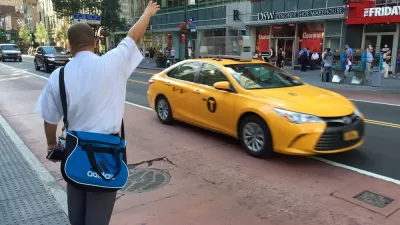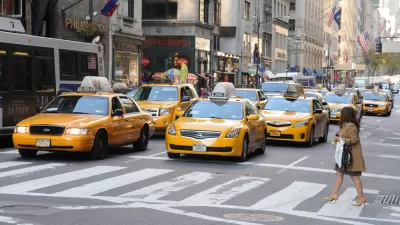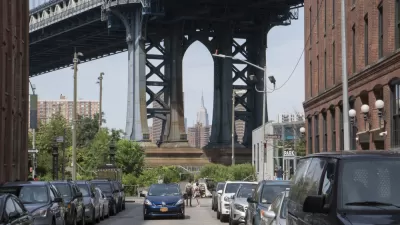To support the taxi industry and reduce congestion, the New York City Council could cap the number of ride-hailing vehicles operating in the city. The cap could be a first major step toward a new era of transportation regulation.

"New York City officials are moving to cap the number of vehicles driving for Uber and other ride-hailing services as part of an aggressive move to address mounting concerns that their explosive growth has led to worsening congestion and low driver wages," reports Emma G. Fitzsimmons.
If the proposed legislation is approved by the New York City Council, it would be the first city in the United States to set a limit on ride-hailing vehicles, according to Fitzsimmons. "Mayor Bill de Blasio, while stopping short of fully endorsing the proposal, suggested that the time had come to rein in the industry," but the mayor also supported a cap, which eventually failed, in 2015. City Council Speaker Corey Johnson proposed the current cap.
Fitzsimmons presents the news of the proposed cap on the number of ride-hailing vehicles in context of the rapid transformation that transportation network companies have had on transportation. That transformation had had significant consequences—for the taxi industry, for congestion, and on the infiltration of mobile app technology into every aspect of daily life.
Andrew J. Hawkins provides coverage of the story for The Verge, and Reuters also reported the news, reflecting the importance of the development for New York, but also for the ongoing, big questions about how cities will regulate transportation in an era of innovation that already includes dockless bikes and electric scooters, and could one day could also include self-driving cars. So far, some cities have proven willing to regulate the number of dockless bikes and to regulate the use of electric scooters, but transportation network companies and companies testing autonomous vehicles have leveraged their industry might (or their popularity with the public) to avoid significant regulation.
FULL STORY: New York Could Become First Major U.S. City to Cap Uber and Similar Vehicles

Planetizen Federal Action Tracker
A weekly monitor of how Trump’s orders and actions are impacting planners and planning in America.

Congressman Proposes Bill to Rename DC Metro “Trump Train”
The Make Autorail Great Again Act would withhold federal funding to the system until the Washington Metropolitan Area Transit Authority (WMATA), rebrands as the Washington Metropolitan Authority for Greater Access (WMAGA).

The Simple Legislative Tool Transforming Vacant Downtowns
In California, Michigan and Georgia, an easy win is bringing dollars — and delight — back to city centers.

The States Losing Rural Delivery Rooms at an Alarming Pace
In some states, as few as 9% of rural hospitals still deliver babies. As a result, rising pre-term births, no adequate pre-term care and "harrowing" close calls are a growing reality.

The Small South Asian Republic Going all in on EVs
Thanks to one simple policy change less than five years ago, 65% of new cars in this Himalayan country are now electric.

DC Backpedals on Bike Lane Protection, Swaps Barriers for Paint
Citing aesthetic concerns, the city is removing the concrete barriers and flexposts that once separated Arizona Avenue cyclists from motor vehicles.
Urban Design for Planners 1: Software Tools
This six-course series explores essential urban design concepts using open source software and equips planners with the tools they need to participate fully in the urban design process.
Planning for Universal Design
Learn the tools for implementing Universal Design in planning regulations.
Smith Gee Studio
City of Charlotte
City of Camden Redevelopment Agency
City of Astoria
Transportation Research & Education Center (TREC) at Portland State University
US High Speed Rail Association
City of Camden Redevelopment Agency
Municipality of Princeton (NJ)





























